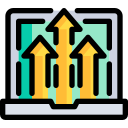Practice That Makes Skills Stick
Choose problems tied to real outcomes: reduce support tickets, speed up reporting, or grow a mailing list. Constraints sharpen creativity. When your work serves an audience, you learn faster because feedback is practical, immediate, and impossible to ignore.
Practice That Makes Skills Stick
Break complex skills into subskills and practice them with clear criteria. Seek expert critiques, not just praise. Record sessions, review mistakes, and set the next micro‑target. Fast, frequent feedback transforms hours into progress instead of quietly reinforcing bad habits.






